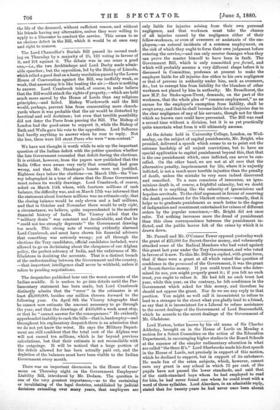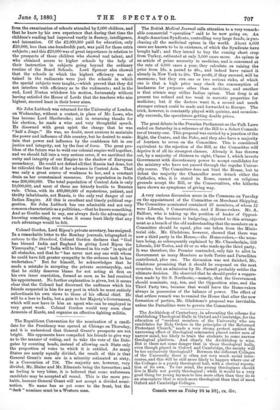Lord Norton, better known by his old name of Sir
Charles Adderley, brought on in the House of Lords on Monday a motion for a Select Committee on the action of the Education Department, in encouraging higher studies in the Board Schools at the expense of the simpler rudimentary education in what are called "the three R's." Lord Sherbrooke made his first speech in the House of Lords, not precisely in support of this motion, which he declined to support, but in support of its substance. He made fun of the extra subjects, which, however, cannot earn any grant in any school in which 75 per cent. of the pupils have not passed the lower standards, and said that of the sixth-standard boys whom he had employed to read for him, he had never found one whom he could trust with a word of three syllables. Lord Aberdare, in an admirable reply, stated that for twenty years he had never once been absent from the examination of schools attended by 2,000 children, and that he knew by his own experience that during that time the children's reading had improved vastly in fluency, intelligence, and intonation. Of the 22,000,000 paid for education, only 220,000, less than one-hundredth part, was paid for these extra subjects ; and this 220,000 was of great importance in relation to the prospects of those children who showed real talent, and who obtained access to higher schools by the help of their instruction in subjects going beyond the ordinary routine of the Board Schools. Lord Spencer also showed that the schools in which the highest efficiency was at- tained in the rudiments were just the schools in which the special subjects were taught,—which proved that they did not interfere with efficiency as to the rudiments; and in the end, Lord Norton withdrew his motion, fortunately without having satisfied the House of Lords that the teachers who aim highest, succeed least in their lower aims.



































 Previous page
Previous page